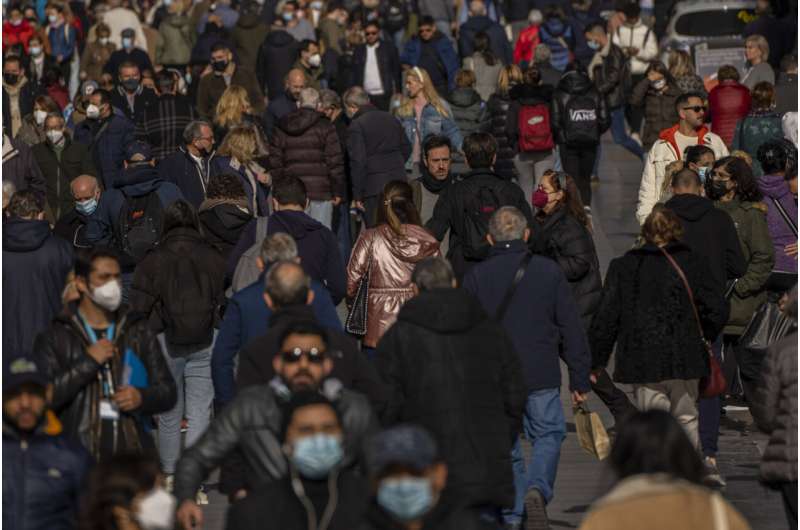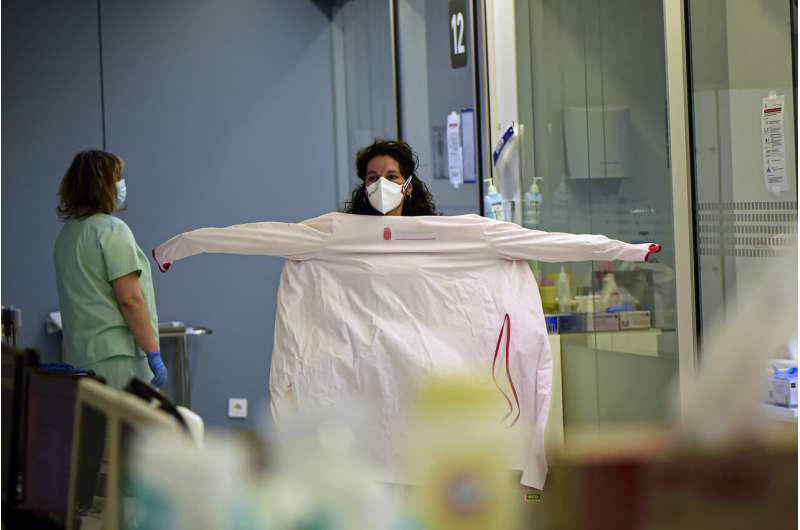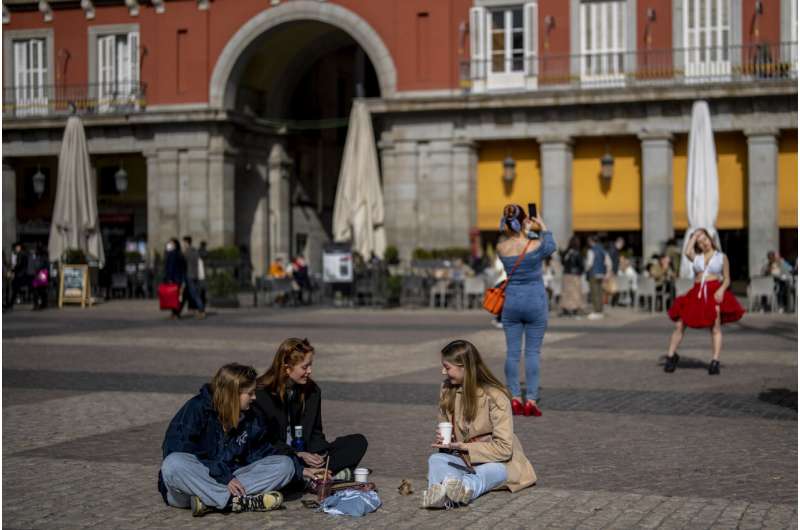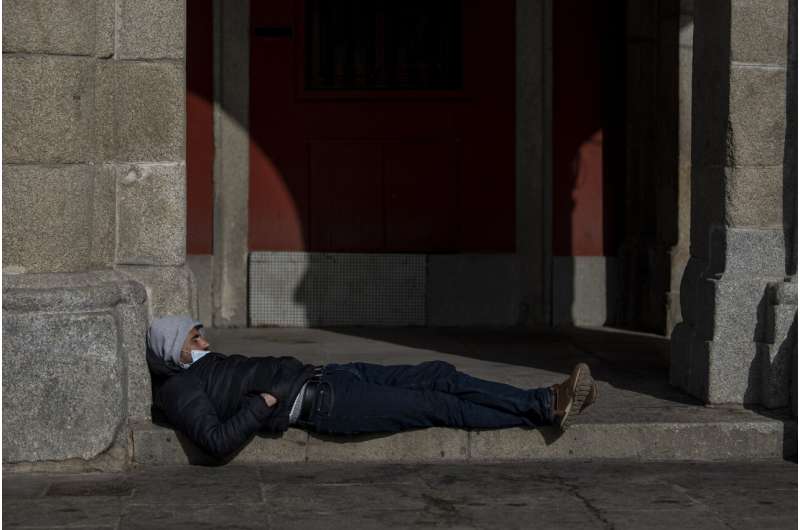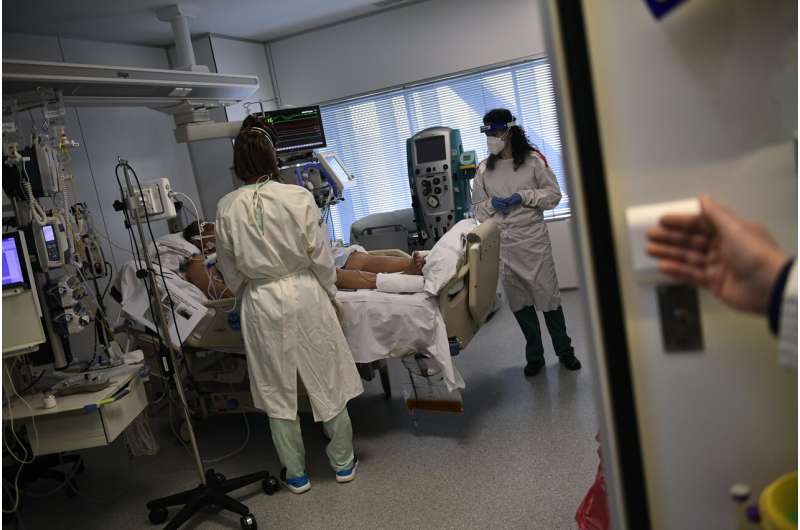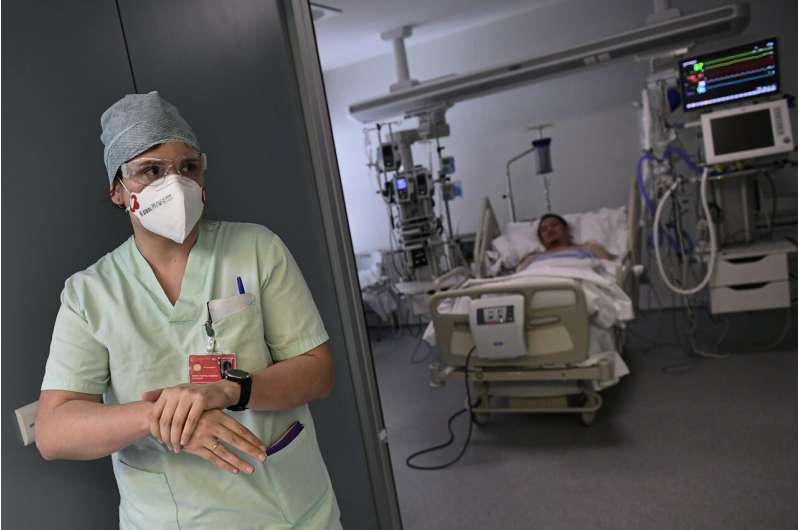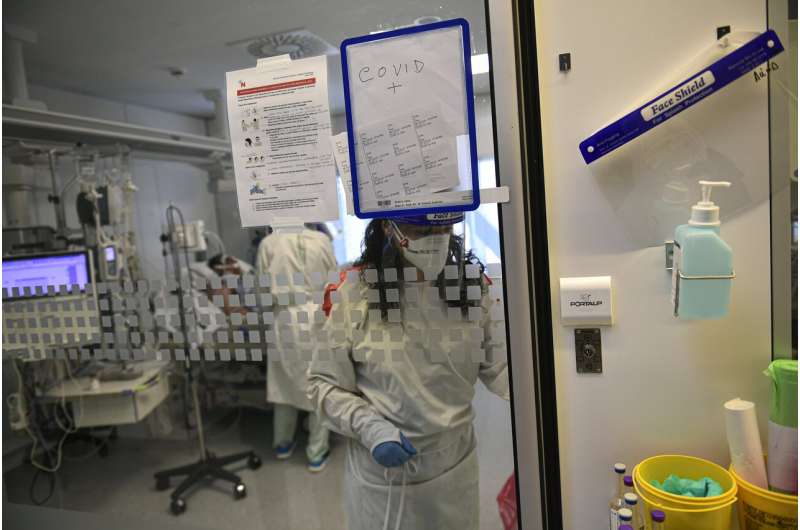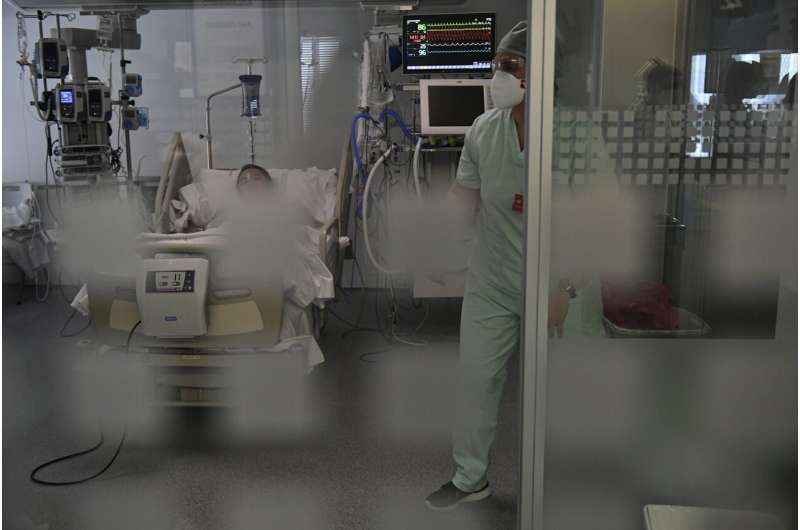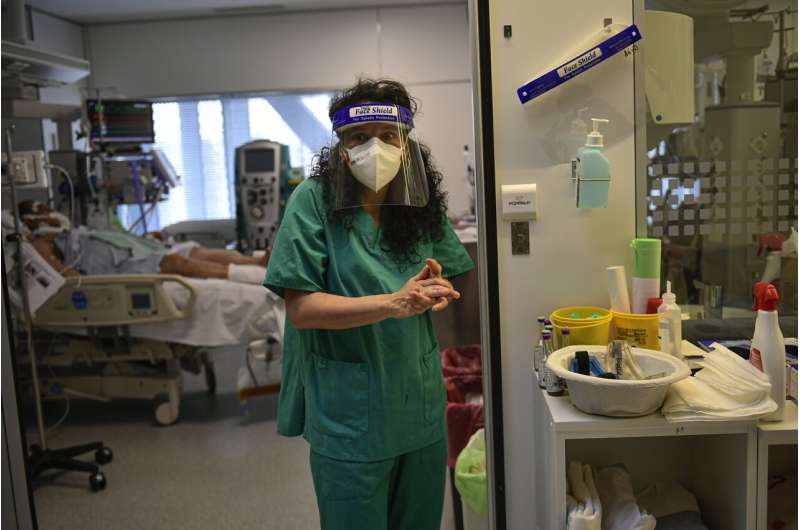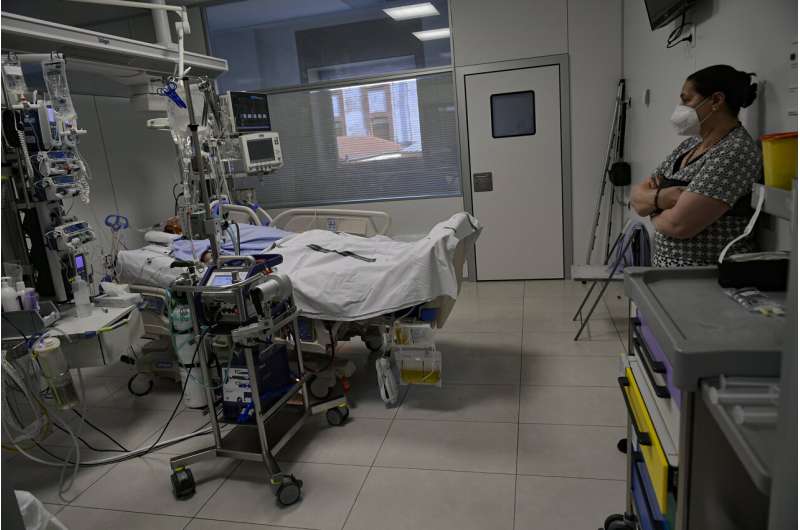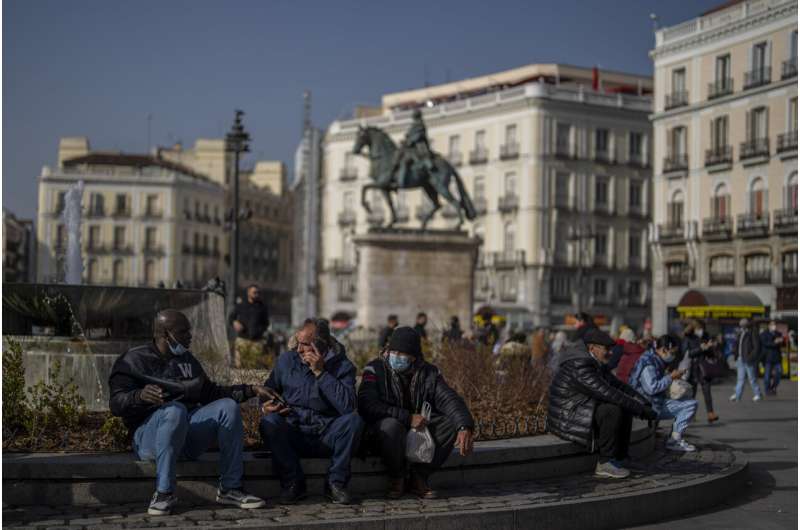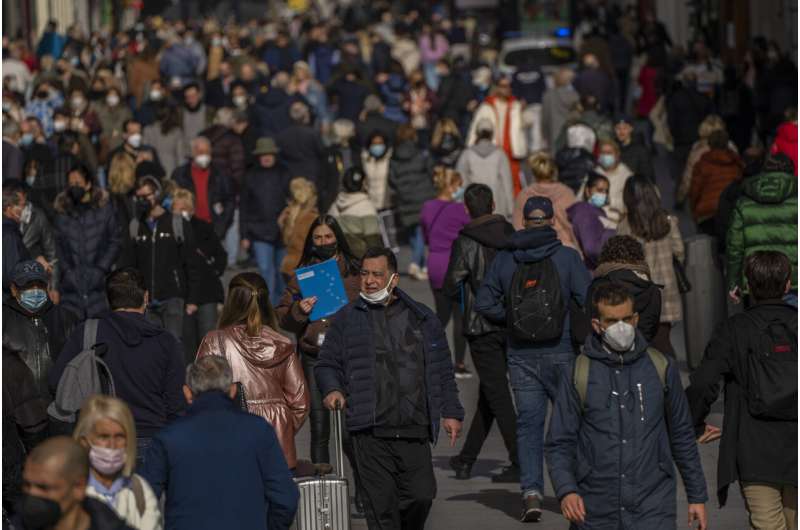People, some of them without face masks to protect against coronavirus walk along a street in downtown Madrid, Spain, Thursday, Feb. 10, 2022. Many Spaniards lowered their facemasks or saved them in their pockets for the first time in nearly two months, ever since the mandate to cover mouths and noses outdoors was reinstated against a fast-spreading variant of the coronavirus. Credit: AP Photo/Manu Fernandez
Spaniards removed their facemasks or stuffed them into their pockets for the first time in nearly two months after the country's outdoor mask mandate was lifted Thursday. Italians face a similar treat Friday.
Both countries have high vaccination rates, declining infection numbers and lower hospitalization figures than during previous surges of the coronavirus.
Sara de la Rubia, a 45-year-old nurse in Madrid, said dropping the masks will be a moment to test the effectiveness of vaccines.
"There has to be a moment in which we have to normalize things, start to (have) a normal life, to test how things work," she said.
After peaking in January, Spain's contagion rate has been dropping for two weeks, alleviating pressure on hospitals and encouraging authorities to relax some of the measures adopted in mid-December against the fast-spreading omicron variant of the coronavirus.
In the Spanish capital's busy shopping district of Callao, many still wore masks on Thursday morning. Among them was Julio García, who welcomed the chance to get rid of the mask but said that he was choosing to remain cautious.
"It's a very personal decision," said García, who is 27 and unemployed. "Not just for me, but also to protect my family, I prefer to take care of myself most of the time, although sometimes I drop my guard."
A medical staff member prepares to attend to a COVID-19 patient in the ICU department of the Hospital Universitario, in Pamplona, northern Spain, Thursday, Feb. 10, 2022. The streets of Spain's main cities provided a fresh sight as many lowered their facemasks for the first time in nearly two months. Masks remain mandatory in indoor public spaces, including public transportation. Credit: AP Photo/Alvaro Barrientos
Under the new rules, schoolchildren will not be required to wear masks during their breaks between classes. But masks remain mandatory in indoor public spaces, including public transportation, and when people are unable to keep a safe distance of 1.5 meters (4 feet) between them.
A skyrocketing pace of new infections since late October peaked on Jan. 21 at 3,418 per 100,000 residents over two weeks, an all-time pandemic record, although experts think official Health Ministry figures do not reflect the complete picture given that many infections were confirmed with home testing kits and not reported to authorities.
The slowdown in contagion has continued, with the 14-day figure dropping on Wednesday to 1,693, from 1,894 the day before. Occupancy of COVID-19 hospitals has dropped to less than a fifth of total capacity and there are more patients being released from intensive care treatment at the moment than being admitted.
-
A group of women without face masks to protect against coronavirus gather at Plaza Mayor square in downtown Madrid, Spain, Thursday, Feb. 10, 2022. Many Spaniards lowered their facemasks or saved them in their pockets for the first time in nearly two months, ever since the mandate to cover mouths and noses outdoors was reinstated against a fast-spreading variant of the coronavirus. Credit: AP Photo/Manu Fernandez
-
A man rests at Plaza Mayor square in downtown Madrid, Spain, Thursday, Feb. 10, 2022. Many Spaniards lowered their facemasks or saved them in their pockets for the first time in nearly two months, ever since the mandate to cover mouths and noses outdoors was reinstated against a fast-spreading variant of the coronavirus. Credit: AP Photo/Manu Fernandez
-
Medical staff members attend to a COVID-19 patient in the ICU department of the Hospital Universitario, in Pamplona, northern Spain, Thursday, Feb. 10, 2022. The streets of Spain's main cities provided a fresh sight as many lowered their facemasks for the first time in nearly two months. Masks remain mandatory in indoor public spaces, including public transportation. Credit: AP Photo/Alvaro Barrientos
-
A medical staff member prepares to attends to a COVID-19 patient in the ICU department of the Hospital Universitario, in Pamplona, northern Spain, Thursday, Feb. 10, 2022. The streets of Spain's main cities provided a fresh sight as many lowered their facemasks for the first time in nearly two months. Masks remain mandatory in indoor public spaces, including public transportation. Credit: AP Photo/Alvaro Barrientos
-
Medical staff members attend to a patient in the ICU department of the Hospital Universitario, in Pamplona, northern Spain, Thursday, Feb. 10, 2022. The streets of Spain's main cities provided a fresh sight as many lowered their facemasks for the first time in nearly two months. Masks remain mandatory in indoor public spaces, including public transportation. Credit: AP Photo/Alvaro Barrientos
-
A medical staff member attends to a COVID-19 patient in the ICU department of the Hospital Universitario, in Pamplona, northern Spain, Thursday, Feb. 10, 2022. The streets of Spain's main cities provided a fresh sight as many lowered their facemasks for the first time in nearly two months. Masks remain mandatory in indoor public spaces, including public transportation. Credit: AP Photo/Alvaro Barrientos
-
A medical staff member prepares to attend to a COVID-19 patient in the ICU department of the Hospital Universitario, in Pamplona, northern Spain, Thursday, Feb. 10, 2022. The streets of Spain's main cities provided a fresh sight as many lowered their facemasks for the first time in nearly two months. Masks remain mandatory in indoor public spaces, including public transportation. Credit: AP Photo/Alvaro Barrientos
-
A relative stands near a COVID-19 patient in the ICU department of the Hospital Universitario, in Pamplona, northern Spain, Thursday, Feb. 10, 2022. The streets of Spain's main cities provided a fresh sight as many lowered their facemasks for the first time in nearly two months. Masks remain mandatory in indoor public spaces, including public transportation. Credit: AP Photo/Alvaro Barrientos
-
People, some of them without face masks to protect against coronavirus, gather at Sol square in downtown Madrid, Spain, Thursday, Feb. 10, 2022. Many Spaniards lowered their facemasks or saved them in their pockets for the first time in nearly two months, ever since the mandate to cover mouths and noses outdoors was reinstated against a fast-spreading variant of the coronavirus. Credit: AP Photo/Manu Fernandez
-
Medical staff members in the ICU department of the Hospital Universitario, in Pamplona, northern Spain, Thursday, Feb. 10, 2022. The streets of Spain's main cities provided a fresh sight as many lowered their facemasks for the first time in nearly two months. Masks remain mandatory in indoor public spaces, including public transportation. Credit: AP Photo/Alvaro Barrientos
-
People, some of them without face masks to protect against coronavirus walk along a street in downtown Madrid, Spain, Thursday, Feb. 10, 2022. Many Spaniards lowered their facemasks or saved them in their pockets for the first time in nearly two months, ever since the mandate to cover mouths and noses outdoors was reinstated against a fast-spreading variant of the coronavirus. Credit: AP Photo/Manu Fernandez
Other European countries are also relaxing their pandemic measures, as more and more governments design protocols to co-exist with the coronavirus.
Italians may also go outdoors without masks starting Friday, with nearly 30% fewer new cases in the last week. The Italian government is discussing lifting the state of emergency on March 31 and, together with it, the indoor mask mandate that was put in place at the beginning of the health crisis.
Authorities in Spain and Italy credit their strong vaccination rates—in both countries about 82% of the population has had two doses of vaccine—for a lower hospital admission rate of COVID-19 patients than in previous infection surges.
Italy has officially recorded nearly 150,000 deaths linked to COVID-19 and Spain just over 95,000.
© 2022 The Associated Press. All rights reserved. This material may not be published, broadcast, rewritten or redistributed without permission.
